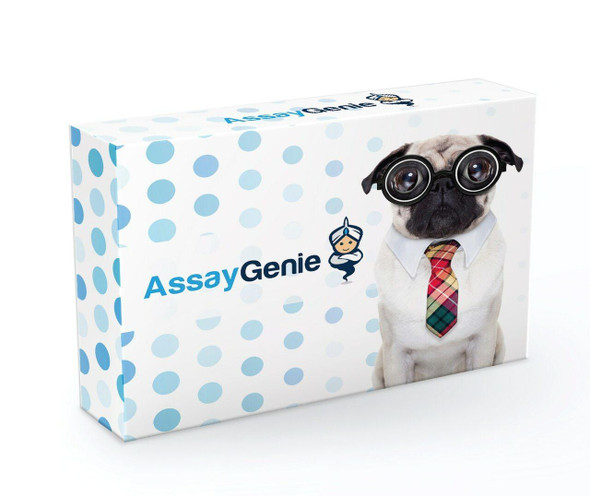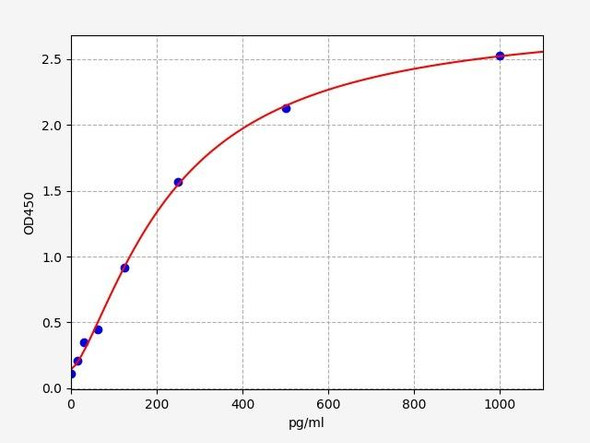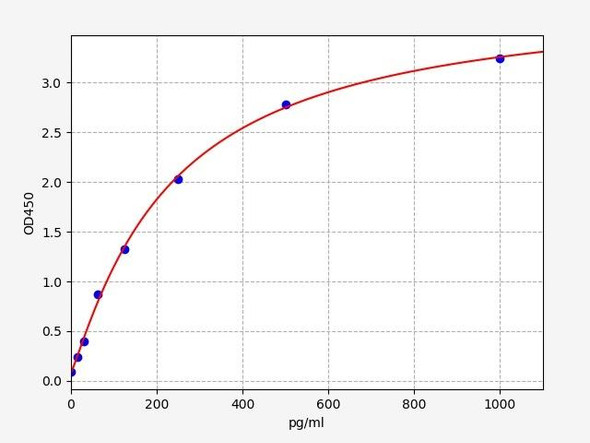Product Name:
Description
Canine MCP-1 / CCL2 ELISA Kit
Key Features
| Save Time | Pre-coated 96 well plate | |
| Quick Start | Kit includes all necessary reagents | |
| Publication Ready | Reproducible and reliable results |
Overview
| | Canine MCP-1 (Monocyte Chemotactic Protein 1) ELISA Kit |
| Product Code: | CNFI00016 |
| Size: | 96 Assays |
| Target: | Canine MCP-1 |
| Alias: | MCP-1, CCL2, GDCF-2, HC11, HSMCR30, MCAF, MCP1, SCYA2, SMC-CF |
| Reactivity: | Canine |
| Detection Method: | Sandwich ELISA, Double Antibody |
| Sensitivity: | 9.375pg/ml |
| Range: | 15.625-1000pg/ml |
| Storage: | 4°C for 6 months |
| Note: | For Research Use Only |
Additional Information
| Recovery | Matrices listed below were spiked with certain level of Canine MCP-1 and the recovery rates were calculated by comparing the measured value to the expected amount of Canine MCP-1 in samples.
| ||||||||||||||||||||
| Linearity: | The linearity of the kit was assayed by testing samples spiked with appropriate concentration of Canine MCP-1 and their serial dilutions. The results were demonstrated by the percentage of calculated concentration to the expected.
| ||||||||||||||||||||
| Intra-Assay: | CV <8% | ||||||||||||||||||||
| Inter-Assay: | CV <10% |
Kit Components
| Uniprot: | |
| UniProt Protein Function: | Chemotactic factor that attracts monocytes, but not neutrophils. Important factor in the course of the inflammatory reaction to reperfusion of the previously ischemic myocardium. May play a significant role in monocyte trafficking into the reperfused myocardium. |
| UniProt Code: | |
| NCBI GenInfo Identifier: | |
| NCBI Gene ID: | |
| NCBI Accession: | |
| UniProt Related Accession: | |
| Molecular Weight: | 11,121 Da |
| NCBI Full Name: | C-C motif chemokine 2 |
| NCBI Official Symbol: | CCL2 |
Protocol
*Note: Protocols are specific to each batch/lot. For the exact instructions please follow the protocol included in your kit.
| Step | Procedure |
| 1. | Set standard, test sample and control (zero) wells on the pre-coated plate respectively, and then, record their positions. It is recommended to measure each standard and sample in duplicate. Wash plate 2 times before adding standard, sample and control (zero) wells! |
| 2. | Aliquot 0.1ml standard solutions into the standard wells. |
| 3. | Add 0.1 ml of Sample / Standard dilution buffer into the control (zero) well. |
| 4. | Add 0.1 ml of properly diluted sample ( Human serum, plasma, tissue homogenates and other biological fluids.) into test sample wells. |
| 5. | Seal the plate with a cover and incubate at 37 °C for 90 min. |
| 6. | Remove the cover and discard the plate content, clap the plate on the absorbent filter papers or other absorbent material. Do NOT let the wells completely dry at any time. Wash plate X2. |
| 7. | Add 0.1 ml of Biotin- detection antibody working solution into the above wells (standard, test sample & zero wells). Add the solution at the bottom of each well without touching the side wall. |
| 8. | Seal the plate with a cover and incubate at 37°C for 60 min. |
| 9. | Remove the cover, and wash plate 3 times with Wash buffer. Let wash buffer rest in wells for 1 min between each wash. |
| 10. | Add 0.1 ml of SABC working solution into each well, cover the plate and incubate at 37°C for 30 min. |
| 11. | Remove the cover and wash plate 5 times with Wash buffer, and each time let the wash buffer stay in the wells for 1-2 min. |
| 12. | Add 90 µl of TMB substrate into each well, cover the plate and incubate at 37°C in dark within 10-20 min. (Note: This incubation time is for reference use only, the optimal time should be determined by end user.) And the shades of blue can be seen in the first 3-4 wells (with most concentrated standard solutions), the other wells show no obvious color. |
| 13. | Add 50 µl of Stop solution into each well and mix thoroughly. The color changes into yellow immediately. |
| 14. | Read the O.D. absorbance at 450 nm in a microplate reader immediately after adding the stop solution. |
Sample Preparation
When carrying out an ELISA assay it is important to prepare your samples in order to achieve the best possible results. Below we have a list of procedures for the preparation of samples for different sample types.
| Sample Type | Protocol |
| Serum | If using serum separator tubes, allow samples to clot for 30 minutes at room temperature. Centrifuge for 10 minutes at 1,000x g. Collect the serum fraction and assay promptly or aliquot and store the samples at -80°C. Avoid multiple freeze-thaw cycles. If serum separator tubes are not being used, allow samples to clot overnight at 2-8°C. Centrifuge for 10 minutes at 1,000x g. Remove serum and assay promptly or aliquot and store the samples at -80°C. Avoid multiple freeze-thaw cycles. |
| Plasma | Collect plasma using EDTA or heparin as an anticoagulant. Centrifuge samples at 4°C for 15 mins at 1000 × g within 30 mins of collection. Collect the plasma fraction and assay promptly or aliquot and store the samples at -80°C. Avoid multiple freeze-thaw cycles. Note: Over haemolysed samples are not suitable for use with this kit. |
| Urine & Cerebrospinal Fluid | Collect the urine (mid-stream) in a sterile container, centrifuge for 20 mins at 2000-3000 rpm. Remove supernatant and assay immediately. If any precipitation is detected, repeat the centrifugation step. A similar protocol can be used for cerebrospinal fluid. |
| Cell culture supernatant | Collect the cell culture media by pipette, followed by centrifugation at 4°C for 20 mins at 1500 rpm. Collect the clear supernatant and assay immediately. |
| Cell lysates | Solubilize cells in lysis buffer and allow to sit on ice for 30 minutes. Centrifuge tubes at 14,000 x g for 5 minutes to remove insoluble material. Aliquot the supernatant into a new tube and discard the remaining whole cell extract. Quantify total protein concentration using a total protein assay. Assay immediately or aliquot and store at ≤ -20 °C. |
| Tissue homogenates | The preparation of tissue homogenates will vary depending upon tissue type. Rinse tissue with 1X PBS to remove excess blood & homogenize in 20ml of 1X PBS (including protease inhibitors) and store overnight at ≤ -20°C. Two freeze-thaw cycles are required to break the cell membranes. To further disrupt the cell membranes you can sonicate the samples. Centrifuge homogenates for 5 mins at 5000xg. Remove the supernatant and assay immediately or aliquot and store at -20°C or -80°C. |
| Tissue lysates | Rinse tissue with PBS, cut into 1-2 mm pieces, and homogenize with a tissue homogenizer in PBS. Add an equal volume of RIPA buffer containing protease inhibitors and lyse tissues at room temperature for 30 minutes with gentle agitation. Centrifuge to remove debris. Quantify total protein concentration using a total protein assay. Assay immediately or aliquot and store at ≤ -20 °C |
| Breast Milk | Collect milk samples and centrifuge at 10,000 x g for 60 min at 4°C. Aliquot the supernatant and assay. For long term use, store samples at -80°C. Minimize freeze/thaw cycles. |
Canine MCP-1 Background
MCP-1, also known as monocyte chemoattractant protein-1, is a chemokine belonging to the CC (or β) subfamily of chemokines. Chemokines are small proteins that play a crucial role in immune responses by regulating the migration and activation of various immune cells.
Function of MCP-1/CCL2
MCP-1/CCL2 primarily acts as a chemoattractant for monocytes and macrophages. It attracts these immune cells to sites of inflammation or injury by promoting their migration from the bloodstream into tissues. It also enhances the adhesion of monocytes to blood vessel walls, enabling their transmigration to the affected area.
Role in Inflammation and Tissue Repair
The chemotactic properties of MCP-1/CCL2 play a vital role in immune responses. By recruiting and activating monocytes and macrophages, it facilitates the clearance of pathogens and the initiation of tissue repair processes. However, dysregulation of MCP-1/CCL2 can contribute to chronic inflammation and the accumulation of inflammatory cells, leading to various diseases.
Implications in Pathological Conditions
MCP-1/CCL2 has been implicated in several diseases, including atherosclerosis, rheumatoid arthritis, multiple sclerosis, and certain types of cancer. In these conditions, the excessive production of MCP-1/CCL2 can exacerbate inflammation, contribute to tissue damage, and promote disease progression. Therefore, targeting MCP-1/CCL2 may hold therapeutic potential in managing these disorders.
Canine MCP-1 FAQs
What is the Canine MCP-1 / CCL2 ELISA Kit?
The Canine MCP-1 / CCL2 ELISA Kit is a laboratory tool for quantitatively measuring MCP-1 / CCL2 levels in biological samples.
How does the Canine MCP-1 ELISA Kit work?
The Canine MCP-1 / CCL2 ELISA Kit employs a sandwich immunoassay principle. It uses specific antibodies to capture and detect MCP-1 / CCL2 in canine samples. The assay involves several steps, resulting in a measurable signal proportional to the concentration of MCP-1 / CCL2.
What are the advantages of using the Canine MCP-1 ELISA Kit?
The Canine MCP-1 / CCL2 ELISA Kit offers specificity for canine MCP-1 / CCL2 analysis, ensuring accurate results. It is sensitive, capable of detecting low MCP-1 / CCL2 levels. The kit is convenient, providing all necessary reagents, and allows for quantitative measurement, providing precise numerical data.
Are there any specific storage or handling requirements for the Canine MCP-1 ELISA Kit?
It is important to store the kit components according to the instructions provided. Typically, the kit should be stored at the recommended temperature, protected from light and moisture. Additionally, proper handling techniques, including following good laboratory practices, should be followed to ensure optimal performance.
Where can I find more information about the Canine MCP-1 ELISA Kit?
For more detailed information about the Canine MCP-1 ELISA Kit, including technical specifications, performance characteristics, and ordering details, please refer to the product brochure or contact our customer support team. We are here to assist you with any inquiries you may have.






